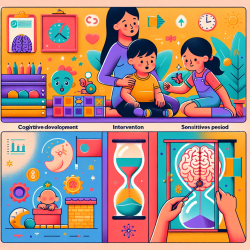Understanding Sensitive Periods: Enhancing Child Development through Timely Interventions
As professionals dedicated to fostering optimal development in children, it is crucial to understand the concept of sensitive periods—developmental windows where specific experiences can have profound long-term effects on the brain and behavior. The research article "Time for new thinking about sensitive periods" (Penhune & de Villers-Sidani, 2014) offers valuable insights into these critical phases and suggests strategies for leveraging them to enhance therapeutic outcomes.
The Science Behind Sensitive Periods
Sensitive periods are times during development when the brain is particularly receptive to certain environmental stimuli. These periods are characterized by heightened plasticity, allowing for significant changes in brain structure and function in response to specific experiences. The research highlights various examples, such as the proficiency in music and language acquisition in children who start training before age 7-8, or the impact of early exposure to adverse experiences on later mental health outcomes.
The evidence for sensitive periods has expanded beyond traditional views, incorporating molecular, genetic, and hormonal mechanisms that underpin these developmental windows. Studies have shown that experiences during sensitive periods can open or close these windows, and that multiple overlapping sensitive periods exist throughout development.
Implications for Practitioners
For practitioners, understanding sensitive periods can inform more effective intervention strategies. Here are some ways to apply this knowledge:
- Early Intervention: Identifying and acting during sensitive periods can maximize the impact of therapeutic interventions. For example, introducing language therapy during early childhood can significantly enhance language acquisition and cognitive development.
- Customized Approaches: Recognize that sensitive periods vary among individuals. Tailoring interventions to the unique developmental timeline of each child can lead to better outcomes.
- Continuous Monitoring: Sensitive periods do not occur in isolation. Continuous assessment and adaptation of strategies are essential as children progress through different developmental stages.
Challenges and Future Directions
While the concept of sensitive periods offers a promising framework for enhancing child development, several challenges remain. Future research should focus on:
- Elucidating the neurobiological and experiential mediators of brain changes during sensitive periods.
- Developing models to predict when sensitive periods occur and which functions are involved.
- Exploring the interaction between experience during sensitive periods and individual differences.
- Investigating how sensitive period-like plasticity can be reactivated in adults to address perceptual or cognitive impairments.
By addressing these challenges, we can refine our understanding of sensitive periods and improve our ability to support children's development effectively.
To read the original research paper, please follow this link: Time for new thinking about sensitive periods.










